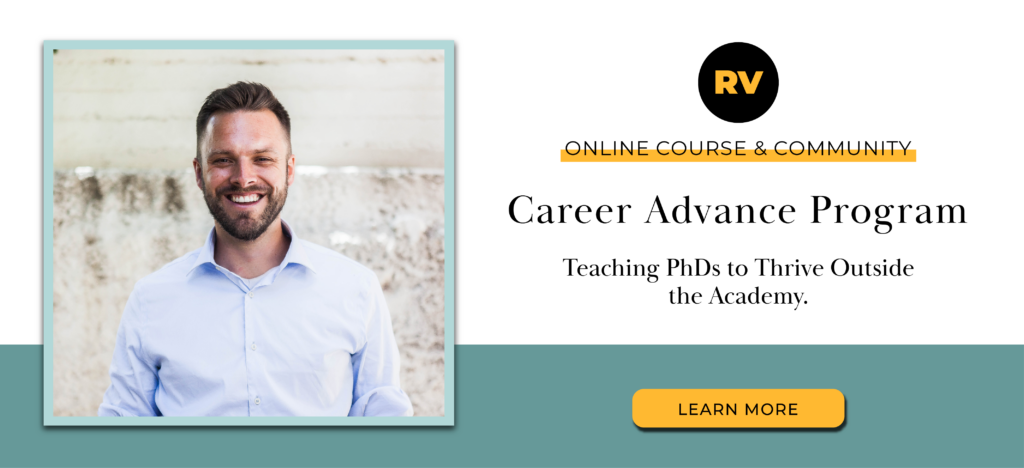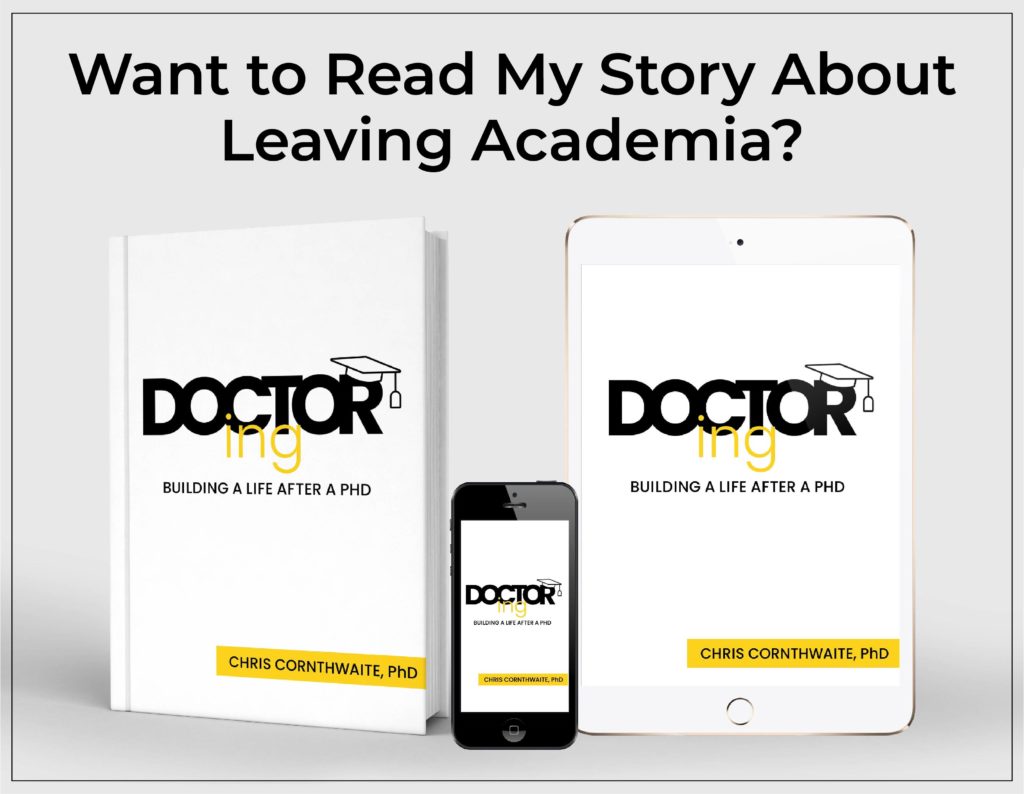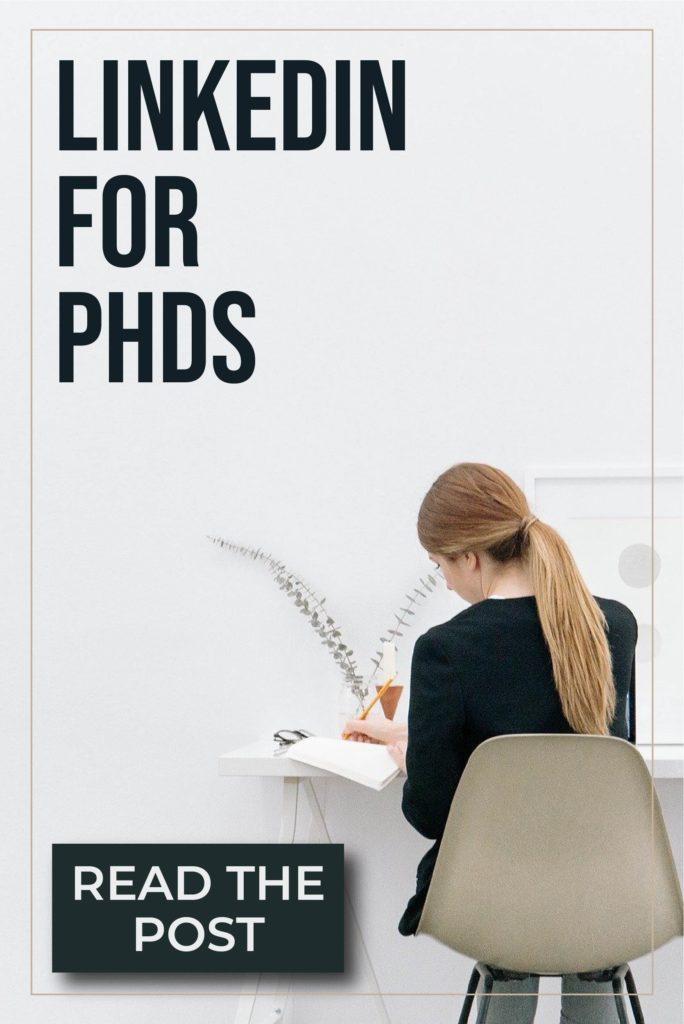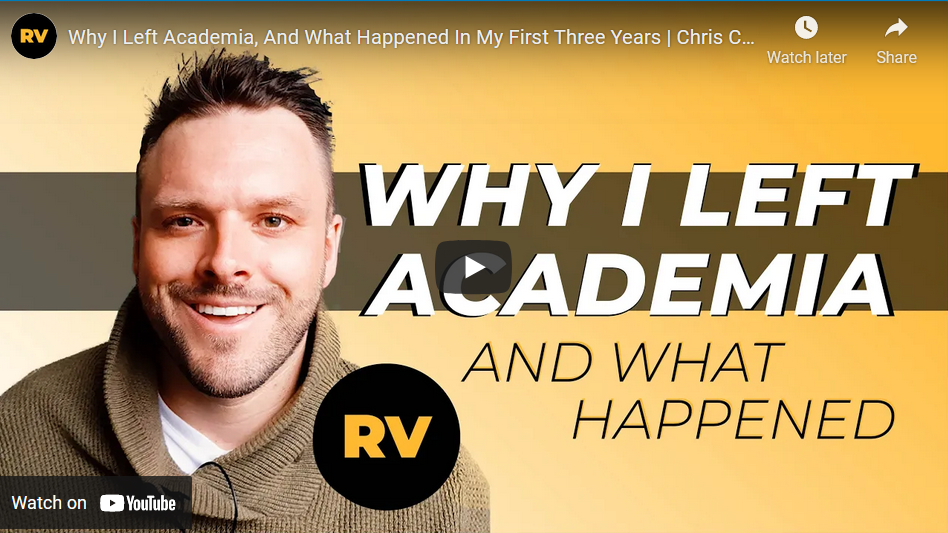Updated Apr. 20, 2021
Quitting academia after my PhD was one of the hardest things I’ve ever done. It took a tremendous toll on my physical and mental health and, worst of all, was extremely lonely.
Like many PhD students, I was in denial. I thought I would be the one to get an academic job. I was sure that if I just published enough, traveled enough, met enough people, and just generally worked hard enough, things would be different for me.
They weren’t.
I ended up walking out of academia with no plans, nowhere to go. When I should have been apartment-hunting for a new place in Edinburgh or Chicago to go with my new tenure-track job, I instead moved back into my parents’ basement for the summer. Oh, and it was with my spouse and 3 kids in tow.
Yeah. That was fun.
When I left, academia was bad. But now, in 2020, I may safely say that it’s worse. The almost no options have turned into literally no options for many people.
So, if you’re thinking of quitting academia, here are some things to think about.
This post may contain links to affiliate products, which–if you choose to purchase–pay us a commission at no extra cost to you. This helps to support our work. We only promote products we’ve used and love. You can read my story about leaving academia in Doctoring: Building a Life With a PhD–Available on Amazon.
Consider what you’re walking away with
Depending on where you’re at in your program, think through what you’re leaving with.
I meet many students who are frustrated in the final year or two of their PhD. As one said, “I don’t even care how close I am to the end. I just want out.”
That sentiment is totally understandable. I felt that way too as I approached the end. But it was actually the Vice President of the think tank I was working for who said to me, “Get it done!” I nodded and made some excuse. “Get it done!” she repeated. She had a PhD herself, and she knew the value it can have in the workplace.
If you are close to the end, and it is at all feasible to finish, it may be worth it. Even if your PhD has no career trajectory outside of academia, it can still be a boost to your brand (which I wrote about in this post).
Now, if you desperately need to walk away for your mental health, your finances, or some other reason, don’t worry. I know several people who left ABD and have great careers.
However, if you are in the position to race to the end, it’s probably worth it to finish.
If you already have a PhD in hand and you’re trapped in an endless cycle of adjuncting or post docs, you have all of the credentials you’re going to get. More adjuncting is not likely to help you in the non-academic marketplace. You can start making the moves to leave now.
(NB A post doc can occasionally be a bridge out of academia with a program like Mitacs in Canada or the various German post-doc schemes.)
Take stock of what you have to offer the marketplace
This is tricky at first. Unless you’re in a STEM field, you may not even know if your degree has any value in the marketplace. And even if you are STEM, you might not have any idea how to get from where you’re at to a career.
It’s going to take some work, but start trying to get a sense of what it would take for you to get paid to do something you love to do, whether it’s lab research, writing, or having coffee with people (yup, you can get paid for that).
Is your discipline knowledge applicable in the marketplace? If you’re studying things like chemistry, engineering, or AI, the answer is probably a resounding YES.
For others like me, with my PhD in religious studies, the answer is probably no. I haven’t found anyone yet who will pay me to talk about ancient-Mediterranean religion.
But that doesn’t mean that you don’t have a lot of high value skills to bring into the marketplace. Even the most obscure PhDs will be surprised at how much they have to offer.
Take stock of your transferable skills (I wrote about how to do that in this post).
Start building a bridge out
You don’t need to fire off a resignation email and disappear. If you have the time, you can begin to build your exit plan on the side.
The first stop here will almost always be networking. Talk to people who are working in roles that you find interesting and ask how they got there. You can do this on LinkedIn (assuming you have a profile—I wrote about how to do this here.)
How do you find these people?
Type a skill that you have into the LinkedIn search box. Say, for example, you enjoy grant writing. If I type “Grant Writing” into the search bar and select “people,” I find people with these jobs:
- Grant Writer (duh)
- Chief Strategy Officer
- Director of Education
- Policy Advisor
- Government Relations Advisor
- Senior Development Officer
That instantly gives me an idea of some of the roles that I might do. Feel free to “creep” people on LinkedIn (note that they get a notification when people look at their profile—you can change what they see about you in your settings).
Once you have those people doing interesting things, send them a message. Tell them that you’re interested in what they do and curious about how they got there. See if you can have a chat with them (I wrote about that here).
This sort of fact-finding, or “informational interview,” will be the first step on your road out. Go talk to 20 people over the course of a few months and learn about the great career options you have.
Believe it or not, this will be the beginning of your bridge out. You may start getting job offers. You might hear about companies hiring, or more people you need to talk to. Talking to these people will change your world.

Find a support system
I found leaving academia a lonely journey, and I’ve since talked to many other PhDs who say the same thing.
According to a Twitter poll I did, 22% of the 350+ PhDs who answered said that their departments were openly hostile to conversations about non-academic careers, and some of those said that they had faced negative consequences for discussing an interest in working outside of academia (this could include being left off of projects, grants, publications, etc. In the case of one ABD PhD student who reached out to me, it even led to being pushed out of a program.) 30% said that their departments were neutral on non-academic jobs, not encouraging or discouraging.
This gaslighting persists in departments, despite the fact that the majority of PhDs will not get academic jobs.
Find people to go through the difficult transition period with you. This may include a good therapist, and will almost definitely include friends and/or family.
If you are partnered, the transition can be very difficult on a spouse too, since they may watch the person they love go through extreme rejection, disappointment, and hopelessness. If necessary, don’t be afraid to seek relationship counseling, and be sure to communicate about it—a LOT!
Come check out one of our social communities if you’re looking for people going through similar processes. You can find links here. Or, find another community to belong to while you’re going through the difficult initial period, perhaps a support group or religious community.
Whatever direction you take, find people to go through it with you. Quitting academia doesn’t have to be done alone.
Work on your mental health
Obviously, this is related to the last point, but just as you should seek people to walk through the transition with you, do your best to guard your mental health too.
Exercise.
Listen to things that inspire you like music or motivational speakers.
I listened to motivational speakers every morning. You know, the types of people that university professors mocked. I found that, when I listened to them, I had a good day and could keep my head in the right place. When I didn’t, the darkness would overwhelm me.
Take that highly-trained mind of yours and turn it towards some big societal problems. Find something that excites you.
Start developing a new vision
Let me tell you what I’ve learned. Most people who are quitting academia think that the goal is to “get a job.”
And it usually is, at first.
But after you have a job, let me tell you what’s going to happen. You’re going to look around and say, “Ok, this paycheck is great. But what do I actually want to do with my life.”
Most PhDs I meet are visionaries. They are directed by some serious inner-drive that leads them to chase great things.
That doesn’t go away upon quitting academia.
AND IT SHOULDN’T!
I hate when PhDs think that quitting academia means giving up on their drive and their dreams.
Don’t you dare. Your goal is not to walk away from your dreams, live a boring life, and retire at 55. Your goal is to find a new vision to define your life. It will drive you to do great things.
Take that highly-trained mind of yours and turn it towards some big societal problems. Find something that excites you.
In other posts, I’ve talked about the darkness. It’s the difficult time PhDs go through after they leave the academy. Leaving comes with a loss of self, loss of purpose, and loss of identity. The darkness is real.
The thing that makes it go away is designing a new vision for your life. I’m reading “The Happiness of Pursuit” by Chris Guillebeau. After achieving his goal of visiting every country in the world, he interviewed hundreds of other people who are chasing unique pursuits.
In the book, he argues that humans thrive off of quests, chasing great visions. It makes us come alive, whether it’s walking across Antarctica or building a charity in our small town.
And I believe that that’s what most PhDs need. They need to develop a new grand vision for their life. And they will, but it takes time.
Read More About Leaving Academia…
PhD Graduates Don’t Need Resumes. They Need a Freaking Vision
Why I Don’t Regret Leaving Academia After a PhD
11 Persistent Myths About Post-PhD Jobs Outside of Academia
LinkedIn for Phds: How to Use It to Build an Amazing Non-Academic Career
Read More:








